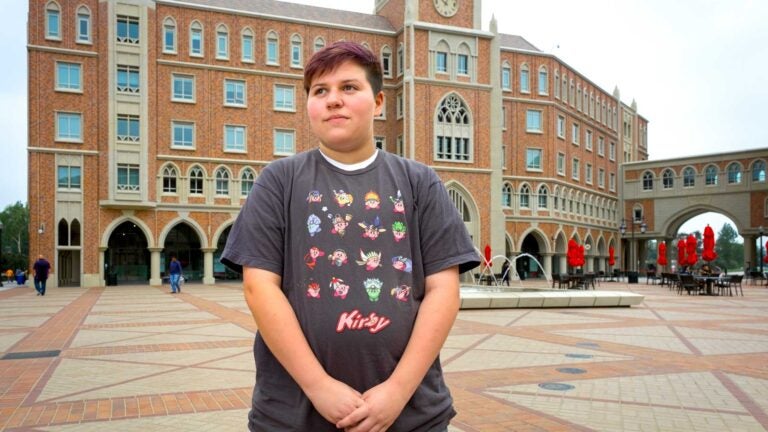
Mattie Rosen is parlaying a childhood love of video games into a potential career. (Photo/Gus Ruelas)
First-year student sees a need in video game design: increasing inclusivity in games
Mattie Rosen grew up loving video games, and now wants to work to see minorities and marginalized communities better represented in them
Mattie Rosen grew up loving video games.
“My cousin had a portable Playstation and I was mesmerized by it,” said Rosen, a first-year student studying interactive media and game design. “I think from there I was really hooked on video games.”
During Rosen’s sophomore year in high school in Atlanta, Rosen came out as gay — later identifying as transgender, transitioning from female to non-binary (Rosen doesn’t choose to identify as male or female). And Rosen started to look at video games differently.
“Coming out made me realize there’s limited representation of queer people, trans people, especially in interactive media,” said Rosen, 17. “I was recently playing a game and the only option was to play as a white cisgender male.”
According to a 2016 report by the International Game Developers Association, less than 2 percent of those in the game industry are transgender. The “prototypical game industry worker” is 32, straight, white, college-educated and childless, the report states.
And in the games themselves, when women or minorities were represented, Rosen felt the portrayals were often insensitive or fetishized.
A potential job?
That made Rosen think maybe this could be a job: designing video games with representation of minorities and marginalized communities in mind.
And, “USC was my reach school,” said Rosen, who received a Presidential Scholarship.
This month, Rosen kicks off studies at the USC School of Cinematic Arts’ Game Design Program, known for its focus on story and meaning when it comes to games, with noted alumni such as Jenova Chen (designer of Cloud, Flow and Journey), Kellee Santiago (co-founder of thatgamecompany and TED fellow) and Susana Ruiz (designer of the award-winning MFA project Darfur is Dying).
“I want to make games that lead players through day-to-day experiences of people unlike them,” Rosen said. “I think placing yourself in another person’s shoes is incredibly helpful in understanding their views and ideas.”
Danny Bilson, chair of the Interactive Media and Games Division at the school, welcomed Rosen.
“We are excited to welcome Mattie,” Bilson said. “Their scholarship and passion for games make them a great addition to our department. We look forward to sharing their interactive journey here at USC Games.”
Getting involved
Besides learning the ins and outs of making games, Rosen is excited to get involved in the school’s LGBTQ community.
“I want to get non-binary as accepted as female or male,” Rosen said.
Being in Los Angeles — a place Rosen hadn’t been since childhood — is huge. “I’m excited to be in a new place where I don’t know where things are,” Rosen said.
The region is an entertainment and tech mecca, a place where game companies such as Electronic Arts and Blizzard have bases.
There’s also the excitement of living in brand-new McCarthy Honors College at USC Village.
“I have a twin sister and she’s going to school up north, and she walked in and was like, ‘This isn’t what mine looks like,’ ” Rosen joked. “In pictures and videos it looks great, but in person it’s just amazing.”
